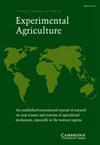衡量农业投资中数据治理的价值:一个案例研究
IF 1.9
4区 农林科学
Q1 Agricultural and Biological Sciences
引用次数: 1
摘要
摘要手头的研究衡量了埃塞俄比亚支持土壤健康干预(SSHI)项目中改善数据治理和访问的价值。我们应用了两个独立但相互关联的模型,一个是定性模型,另一个是定量模型,以创建一个新的框架来增强传统的成本效益分析。定性分析为价值的具体类型及其产生机制提供了新的见解。这些结果支持了一个创新框架的发展,以定量衡量这种感知价值。通过将定量和定性框架相结合,该研究表明,有可能对数据治理和访问的成本和收益进行合理可信的定量估计。虽然承认这些估计只是说明性的,但案例研究结果表明,在特定的时间点,SSHI数据治理活动产生了负回报。然而,间接的社会和公共利益很少被量化,但本文表明,至少从更普遍的经济角度来看,扭转这种观点所需的“间接”利益(当前但未计量,或可计量但未来)相对较少。本文章由计算机程序翻译,如有差异,请以英文原文为准。
Measuring the value of data governance in agricultural investments: A case study
Summary The study at hand measures the value of improving data governance and access in the Supporting Soil Health Interventions (SSHI) project in Ethiopia. We applied two separate but interlinked models, one qualitative and one quantitative, to create a new framework enhancing the traditional cost–benefit analysis. The qualitative analysis provided novel insights into the specific types of value and the mechanisms through which they are generated. These results underpinned the development of an innovative framework to measure this perceived value quantitatively. By combining the quantitative and qualitative framework, the study demonstrated that it is possible to generate plausible and credible quantitative estimates of both costs and benefits of data governance and access. While acknowledging that the estimates are only illustrative, the case study results suggested on a direct cost measure, at a particular point in time, the SSHI data governance activities yielded a negative return. However, indirect social and public benefits are rarely quantified, but this paper shows that relatively few “indirect” benefits (current but unmeasured, or measurable but in the future) are necessary to reverse that view, at least from the point of the economy more generally.
求助全文
通过发布文献求助,成功后即可免费获取论文全文。
去求助
来源期刊

Experimental Agriculture
农林科学-农艺学
CiteScore
2.50
自引率
6.20%
发文量
29
审稿时长
24 months
期刊介绍:
With a focus on the tropical and sub-tropical regions of the world, Experimental Agriculture publishes the results of original research on field, plantation and herbage crops grown for food or feed, or for industrial purposes, and on farming systems, including livestock and people. It reports experimental work designed to explain how crops respond to the environment in biological and physical terms, and on the social and economic issues that may influence the uptake of the results of research by policy makers and farmers, including the role of institutions and partnerships in delivering impact. The journal also publishes accounts and critical discussions of new quantitative and qualitative methods in agricultural and ecosystems research, and of contemporary issues arising in countries where agricultural production needs to develop rapidly. There is a regular book review section and occasional, often invited, reviews of research.
 求助内容:
求助内容: 应助结果提醒方式:
应助结果提醒方式:


